




Medicare Advantage Plans Georgia 2026
Looking for details on the potential Medicare Advantage plans in Georgia
Key Takeaways
- Certain Medicare Advantage Plans in Georgia may provide additional benefits that could go beyond Original Medicare, such as vision, dental, and hearing services.
- Georgia offers a variety of Medicare Advantage Plans, including HMO, PPO, and Special Needs Plans (SNPs), each catering to different healthcare needs and preferences.
- The enrollment process for Georgia Medicare Advantage Plans includes several periods such as the Annual Enrollment Period and Special Enrollment Periods, allowing individuals to choose suitable plans based on their needs.
Compare Plans in One Step!
Enter Zip Code
Understanding Georgia Medicare Advantage Plans

Medicare Advantage Plans, also known as MA Plans, could serve as an alternative to Original Medicare, potentially offering additional benefits that may go beyond standard Medicare coverage. In Georgia, some plans have seen a surge in popularity, with approximately 1.9 million residents enrolled in Medicare as of 2024. Certain plans may include supplemental benefits such as vision, dental, and hearing services, possibly making them an attractive option for many.
The variety and flexibility of Medicare Advantage Plans in Georgia may also be noteworthy. In 2025, there were 162 different plans available. This potential range of options could potentially ensure that there may be a suitable plan for member’s healthcare needs and budget.
Types of Georgia Medicare Advantage Plans Available
Georgia will likely offer a diverse range of Medicare Advantage Plans to meet various healthcare needs. These include Health Maintenance Organization (HMO) plans, Preferred Provider Organization (PPO) plans, and Special Needs Plans (SNPs). Each type has its unique features and benefits, catering to different preferences and medical requirements.
HMO Plans
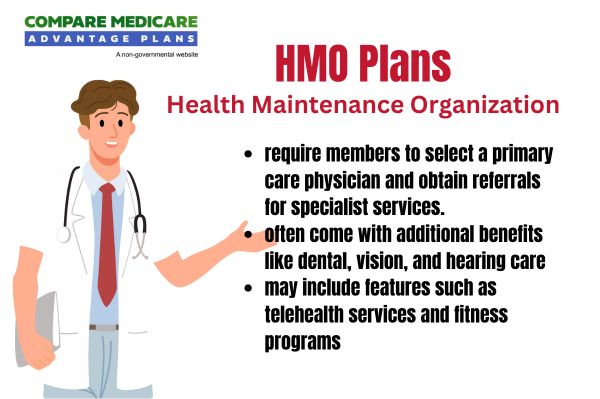
HMO plans may be a popular choice among Georgia residents due to their lower costs and network-based structure. These plans require members to use a network of doctors and hospitals for their healthcare services, which could lead to significant savings.
Some HMO plans might incorporate prescription drug coverage. This could potentially mean that members might not need to purchase a separate prescription drug plan, possibly simplifying their healthcare management. Additionally, certain plans may also come with supplemental benefits such as dental, vision, and hearing coverage.
HMO plans could offer a cost-effective and comprehensive healthcare solution for Georgia residents, likely focusing on using network providers and potentially integrating various health services under one plan.
PPO Plans
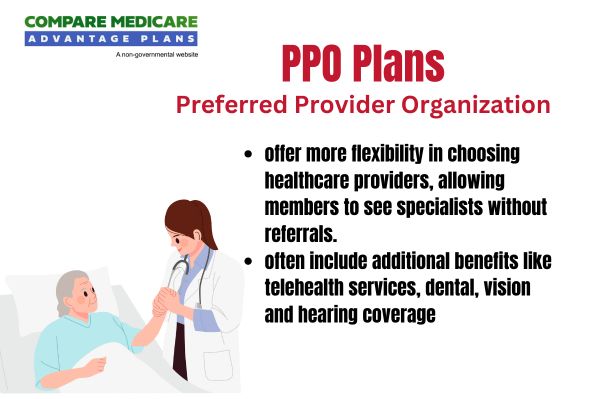
PPO plans provide greater flexibility compared to HMO plans, allowing members to see out-of-network providers without a referral, albeit at a higher cost. This flexibility could be particularly beneficial for those who want the freedom to choose their healthcare providers.
PPO plans has remain a popular choice in recent years due to their flexibility and extensive provider networks. The flexibility and comprehensive coverage these plans could offer might make them a valuable option for many Georgia residents.
Special Needs Plans (SNPs)

Special Needs Plans (SNPs) are tailored to individuals with specific health conditions or those who qualify for both Medicare and Medicaid. These plans will likely provide targeted benefits and services that could meet the unique needs of their members.
There are three main types of SNPs: Dual Eligible SNPs (D-SNP), which cater to individuals eligible for both Medicare and Medicaid; Chronic Condition SNPs (C-SNP), designed for those with specific chronic diseases; and Institutional SNPs (I-SNP), for individuals who require institutional-level care.
Eligibility for SNPs requires individuals to have both Medicare Part A and Part B and to reside in the plan’s service area. This ensures that the plans could provide the necessary support and services to those most in need. SNPs may be structured as either HMO or PPO plans, offering flexibility in provider networks and care options.
Overall, SNPs could offer a valuable solution for individuals with specific healthcare needs, possibly providing tailored benefits and comprehensive support to enhance their quality of life.
Overview of Georgia Medicare Advantage Plans
With nearly 1.9 million residents enrolled in Medicare in 2024, the demand for Medicare Advantage plans in Georgia will likely be significant. For 2025, the state will likely offer several Medicare Advantage plans, likely providing a wide range of options for beneficiaries.
Covered Services and Possible Benefits
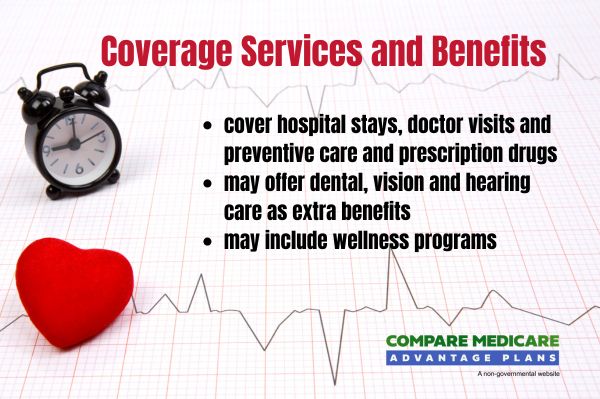
Medicare Advantage plans in Georgia will likely cover a wide range of medical services, including hospital stays, and outpatient services. These supplemental benefits could enhance the overall healthcare experience, addressing needs that Original Medicare does not typically cover.
Certain Medicare Advantage plans may also incorporate additional benefits, such as dental, vision, hearing, and sometimes prescription drug coverage.
Potential Benefits of Georgia Medicare Advantage Plans
One of the potential advantages of Georgia Medicare Advantage plans could be their affordability, as some plans may feature lower monthly premiums. Some plans may also provide extensive coverage for services such as dental, vision, and hearing, which are not typically included in Original Medicare. This additional coverage could potentially enhance the quality of care and overall health of members.
Additionally, certain Medicare Advantage plans may also integrate prescription drug coverage, possibly simplifying the healthcare management process for beneficiaries.
Enrollment Process for Georgia Medicare Advantage Plans
Enrolling in a Georgia Medicare Advantage plan likely requires understanding the various enrollment periods and eligibility criteria. The enrollment process is designed to allow eligible individuals to choose from a wide range of plan options during designated enrollment periods.
To enroll, use this website or call one of our licensed agents at 1-833-641-4938 (TTY 711), Mon-Fri 8 am-9 pm EST. It’s crucial to be aware of these periods to ensure timely enrollment and continuous coverage.
When to Enroll
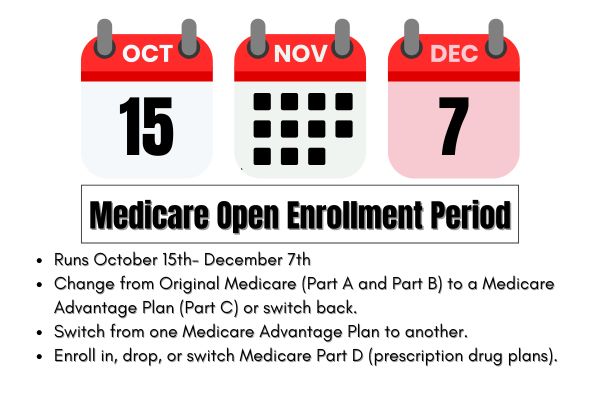
Eligible beneficiaries can enroll in Medicare Advantage plans during the Annual Enrollment Period, which typically occurs from October 15 to December 7 each year. This period allows individuals to review and change their plans based on their healthcare needs and preferences. Additionally, individuals turning 65 have a specific seven-month window to enroll in Medicare, which includes the three months before, the month of, and three months after their birthday.
For those whose plans are being discontinued, it’s essential to enroll in a new plan by December 31, to avoid a lapse in coverage. The Annual Enrollment Period starting on October 15 every year is the ideal time to explore new plan options and make necessary changes.
A Special Enrollment Period will be available from December 8 to February 28 each year. This period offers an opportunity for individuals impacted by plan discontinuations to sign up for new plans.
Different Enrollment Periods
In addition to the Annual Enrollment Period, there are several other enrollment periods available. The Initial Enrollment Period is for individuals turning 65, providing a seven-month window around their birthday to enroll in Medicare. The General Enrollment Period occurs annually from January 1 to March 31, allowing individuals who missed their initial enrollment to sign up for Medicare.
Special Enrollment Periods (SEPs) are available for individuals who experience qualifying life events, such as moving or losing other health coverage. These periods provide flexibility for those who need to make changes outside the standard enrollment windows.
The Annual Enrollment Period for Medicare Advantage plans starts on October 15 and ends on December 7 each year, offering an opportunity to review and adjust coverage options.
OEP, AEP, Special Enrollment
The Medicare Advantage Open Enrollment Period (OEP) occurs annually from January 1 to March 31, allowing beneficiaries already enrolled in a Medicare Advantage plan to switch plans or revert to Original Medicare. This period provides an additional opportunity to make changes if the Annual Enrollment Period was missed or if healthcare needs have changed.
The Annual Enrollment Period (AEP) typically runs from October 15 to December 7, during which beneficiaries can enroll in or switch Medicare plans. During this period, multiple changes can be made to plans, offering flexibility in choosing the best coverage options.
Special Enrollment Periods (SEPs) enable beneficiaries to change their Medicare plans outside of the standard enrollment periods if they qualify based on specific life events, such as moving or losing job-related coverage.
Possible Costs Associated with Medicare Advantage Plans

The potential costs of Medicare Advantage plans may vary significantly based on the type of plan, location, and specific benefits offered.
Premiums and Co-Pays
Certain Medicare Advantage plans may require a premium in addition to the standard Medicare Part B premium, and co-pays for particular services may differ depending on the plan.
The co-pays for various medical services under these plans may vary widely. These costs could significantly affect the affordability of healthcare, particularly for those who frequently use medical services.
Some plans may also have additional out-of-pocket costs for various covered services, which members should consider when selecting a plan. Overall, while the potential premiums and co-pays for Medicare Advantage plans might vary, understanding these costs is crucial for making informed decisions about healthcare coverage.
Out-of-Pocket Maximums
Some Medicare Advantage plans may offer a cap on out-of-pocket limits, which could protect members from excessive expenses in a given year. This potential benefit could be particularly beneficial compared to Original Medicare, which does not impose a limit on out-of-pocket expenses.
The out-of-pocket maximum might vary by plan and will likely be designed to protect members from high medical costs in a given year. This means that once members reach their out-of-pocket maximum, the plan could cover up to 100% of the costs for covered services for the remainder of the year.
Using in-network providers under various plans may also help members incur lower out-of-pocket costs. This potential financial safeguard could make Medicare Advantage plans a valuable option for those looking to manage their healthcare expenses effectively.
Covered Services and Possible Benefits
Medicare Advantage plans will likely provide coverage for a wide range of medical services, including hospitalization, and outpatient care. Some plans may also include additional benefits such as dental, vision, and hearing services, which are not typically covered by Original Medicare. This comprehensive coverage possibly ensures that members could have access to necessary healthcare services without incurring significant out-of-pocket costs.
Certain plans might offer prescription drug coverage as part of their benefits package, possibly simplifying the process for members.
How to Qualify for Georgia Medicare Advantage Plans 2026
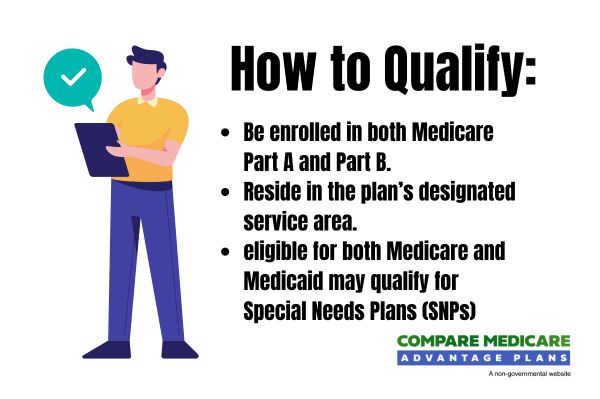
To qualify for a Medicare Advantage Plan in Georgia, individuals must be enrolled in Medicare Parts A and B. This means they must have hospital insurance (Part A) and medical insurance (Part B). Additionally, individuals must verify their residency and eligibility status as part of the enrollment process.
Eligibility for Medicare Part B may also be available to individuals who have lived in the U.S. for at least five years, even if they do not have the required work history. Medicare Advantage plans in Georgia include benefits from Medicare Parts A, B, and sometimes D, likely providing comprehensive coverage for various healthcare needs.
Contracted Network and Access to Care
Medicare Advantage plans allow members to access a network of healthcare providers, including local hospitals and specialists that accept the plan. Members of PPO plans have the flexibility to see any provider who accepts Medicare, including those outside the network, although using in-network providers might result in lower costs.
For HMO plans, a primary care provider typically coordinates all healthcare services, likely ensuring members receive comprehensive care tailored to their needs. Emergency services are covered worldwide under some Medicare Advantage plans, giving members access to urgent care regardless of location.
Comparing Georgia Medicare Advantage Plans to Original Medicare
Some Georgia Medicare Advantage Plans might include extra benefits not available in Original Medicare, such as vision, dental, and hearing coverage.
Coverage Differences
Certain Medicare Advantage plans in Georgia may provide additional services that could enhance the standard coverage. Unlike Original Medicare, which only covers hospital and medical services, some plans may include coverage for prescription drugs, possibly simplifying healthcare management for beneficiaries. Medicare Advantage plans will likely include both HMO and PPO options, allowing for different levels of flexibility in choosing healthcare providers.
Other potential benefits, such as dental, vision, and hearing services, may also be incorporated into specific Medicare Advantage plans, possibly providing comprehensive coverage that Original Medicare does not typically offer.
These various differences in coverage could make Medicare Advantage plans a valuable option for those seeking more comprehensive healthcare services.
Cost Comparisons

Some Medicare Advantage plans may offer a lower premium compared to the combined cost of Original Medicare and a separate Medigap policy. Certain Medicare Advantage plans may offer varied monthly premiums. This range of options could allow individuals to choose a plan that fits their budget and healthcare needs.
The annual out-of-pocket maximum for specific Medicare Advantage plans may vary depending on the specific plan selected. Some of these potential costs might be lower than the out-of-pocket costs associated with Original Medicare.
Emergencies and Referrals
HMO plans necessitate a referral from a primary care provider to see specialists, while PPO plans do not require a referral. This structure ensures that members receive coordinated care, especially under HMO plans. In emergency situations, Medicare Advantage members can seek care from out-of-network providers without prior authorization. This flexibility could be crucial for ensuring timely and necessary care during emergencies.
Members of Medicare Advantage plans have access to emergency room services worldwide, ensuring that they are covered regardless of location. Emergency services are generally covered regardless of whether the provider is in-network or out-of-network, providing peace of mind to members.
Summary
Georgia Medicare Advantage Plans
Frequently Asked Questions
→ When can I enroll in a Medicare Advantage plan in Georgia?
You can enroll in a Medicare Advantage plan in Georgia during the Annual Enrollment Period from October 15 to December 7, or during a Special Enrollment Period if you qualify due to specific life events.
→ What are the potential costs associated with Medicare Advantage plans?
Medicare Advantage plans will likely involve various costs, which may include a monthly premium, co-pays, and an annual out-of-pocket maximum, which might vary by plan and location. It’s essential to review specific plan details to understand your potential expenses.
→ What types of additional benefits could Medicare Advantage plans offer?
Some Medicare Advantage plans may offer additional benefits such as dental, vision, hearing services, and sometimes prescription drug coverage, possibly enhancing overall healthcare coverage.
→ How do HMO plans differ from PPO plans?
HMO plans mandate the use of a specific network and require referrals for specialists, while PPO plans provide more flexibility by allowing members to see out-of-network providers without needing referrals. This distinction could potentially affect your healthcare choices.
→ What should I do if my current Medicare Advantage plan is discontinued?
If your Medicare Advantage plan is discontinued, you should enroll in a new plan during the Annual Enrollment Period or a Special Enrollment Period to maintain continuous coverage.

ZRN Health & Financial Services, LLC, a Texas limited liability company


